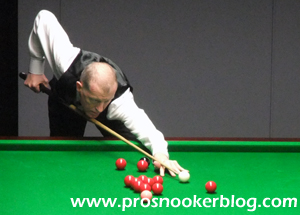
Six world titles, six UK titles, 100 career finals and a raft of other top honours, Steve Davis has achieved much during his long career, but will his remarkable longevity in the upper echelons of the sport prove to be his greatest achievement of all? Who knows, but to celebrate the achievements of a man still capable of competing with the best, I have recounted some of his finest triumphs to help you perhaps decide…
1981 World Championship
Then world number 13 Steve Davis arrived at the Crucible for the third time in his career in 1981 on the back of a successful season which had already seen him capture the UK Championship, Wilson’s Classic, Yamaha International Masters and the English Professional Championship. As a result some were tipping The Nugget to go all the way in Sheffield and as we were to discover, he was not to disappoint.
Steve began his campaign against an opponent who at the age of 18 years and 11 months was at the time the youngest player to compete at the Crucible. His name was Jimmy White and early on the future ‘People’s Champion’ was to give a good account of himself, before breaks of 106 and a match high run of 119 from Davis helped him to an 8-4 lead after two sessions. As it happened Jimmy was to fight back well as the match resumed, breaks of 50, 50 and 42 enough to close the gap to 8-7 before Davis recovered with runs of 71 and 56 to eventually move into the second round.
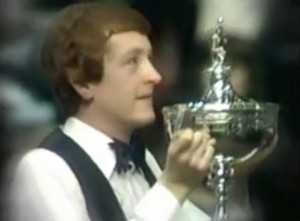
Steve lifts his first world title…
There he would meet the man who had beaten him the previous year, Alex Higgins, but this time it would be Davis who would come out on top a 13-8 winner. Beginning the match with what would prove to be a match-high break of 78, Steve would eventually finish the first session with a four frame advantage at 6-2 which try as he might the Northern Irishman was never able to overturn.
In the quarter-finals he was to repeat his victory of a year earlier against 1979 world champion Terry Griffiths, thanks largely to a second session which saw him win five of the six frames played, before he was to come through 16-10 against Cliff Thorburn following their four-session semi-final. While that victory may have appeared relatively one-sided on paper, it should be noted that Cliff actually led 8-6 after two sessions before Davis turned the match on its head, winning the last five frames from 11-10 up.

…shortly after nearly being knocked off his feet by a jubilant Barry Hearn!
In the final he would meet Doug Mountjoy, the Welshman having previously seen off Ray Reardon, Dennis Taylor, Eddie Charlton and Willie Thorne to get that far. Early on the final looked like it would be a one-sided affair as Steve took the first six frames, restricting his opponent to just 100 points as he amassed a six frame lead. To his credit Mountjoy was to close the gap to 14-12 but a four-frame burst including breaks of 119, 84, 49 and 44 ensured that Davis would not be denied and led to those now famous pictures of him being hugged by manager Barry Hearn post-match!
1987/8 ‘Triple Crown’
To date a feat achieved only four times (and by three players), in 1987/8 Steve Davis became the first man to win the UK Championship, Masters and World Championship tournaments in the same season, an achievement known in some circle’s as snooker’s ‘triple crown.’
The first leg of Steve’s success was to be achieved at the UK Championship in Preston as he captured his fourth consecutive UK title with a 16-14 victory against Jimmy White.
His success at the Masters, perhaps surprisingly only his second at the time, was to prove somewhat more emphatic as whitewashes against Terry Griffiths and then notably Mike Hallett in the final underlined the fact that he was at the peak of his powers.
Further confirmation if it were needed was to come at the Crucible in 1988 as he was to successfully defend the world title, taking his fifth in total with an 18-11 victory against Welshman Terry Griffiths. Steve’s campaign had started with a hard-fought 10-8 victory against John Virgo before he again dismantled the unfortunate Mike Hallett in the second round, winning 13-1 with a final frame break of 106.
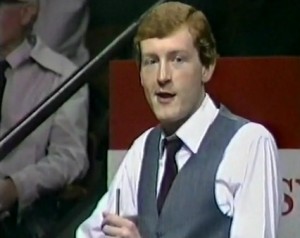
His quarter-final was to prove a similar story as from 3-2 ahead early on against Tony Drago, he surged to a 13-4 victory with nine breaks over 50, before winning his semi-final with Cliff Thorburn by a comfortable 16-8 scoreline.
The final against Griffiths was to be their sixth meeting of the decade at the Crucible and although it was their first in a final, the outcome was to be the same as the previous five as Davis emerged victorious. Early on the two looked to be evenly matched as they finished the first day locked at 8-8 but it was to be the third session which would prove critical, Davis winning six of the eight frames played to move into a 14-10 lead.
Finishing with a flourish, Davis rattled in breaks of 118 and 123 during the evening session on his way to an 18-11 victory and not only his fifth world title, but to conclude arguably his most successful season of all.
1989 World Championship
Steve’s final Crucible triumph (so far!), in 1989 was arguably his most emphatic as he lifted the trophy for the loss of just 23 frames.
Early victories against Steve Newbury, Steve Duggan and Mike Hallett were particularly crushing, Davis racing to 6-0 and 7-0 leads respectively against Duggan and Hallett before eventually taking 13-3 victories in both matches.
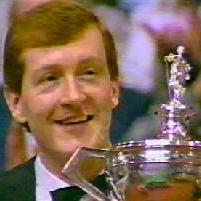
His semi-final looked like it would be a similar story as he moved into a 10-2 lead against Scottish youngster Stephen Hendry before the future world number one rallied to close the gap to 13-9 at the close of the third session with a top break of 139. Davis though would have the last laugh, taking the next three frames to move into his eighth final.
There his opponent would be Liverpool’s John Parrott, a man who had experienced a far tougher route to the final having at one stage trailed 9-8 to Steve James during his opening round match. The final however was not to be that close, or anything like it as having taken five of the opening seven frames, Davis then ruthlessly added eight of the following nine with top breaks of 112, 80, 68, 60, 59 and 55 to once again lead 13-3 at the close of the second session.
There was to be no let up in the third session either as Davis took the opening five frames to record a crushing 18-3 win which remains a record to this day.
1997 Masters
With six world and six UK titles behind him, Steve’s tally of two Masters titles was a relatively small return in comparison, but in 1997, some nine years after his previous Wembley triumph, Davis was to record a remarkable third victory at the venue.
He began his run with a 6-4 victory against Scotland’s Alan McManus, a winner of the gold trophy three years earlier in 1994 before further wins against future world champions Peter Ebdon and Ken Doherty saw him move into a surprise final.
There he would face Ronnie O’Sullivan, the 21-year-old already into his third consecutive final having beaten John Higgins in 1995 before losing out to Stephen Hendry the following January.
Beginning the final as favourite, Ronnie justified that status in the early stages of the match as back to back centuries in the opening two frames gave him an early cushion. Steve was not to be fazed however and with the aid of an excellent double on the blue in frame five as well as a timely fluke on the yellow in frame seven was to draw level at the end of the session.
As Steve had done himself to so many opponents in the past however, O’Sullivan began the second session in imperious form, taking four frames in 49 minutes including another century to secure what would surely be an unassailable 8-4 lead.
There was though to be another twist to the tale as Davis dug deep to find his best form and close the gap to one frame at 7-8 with a vintage break of 130, before adding the following three to secure a popular triumph at the Conference Centre.
2005 UK Championship
At 48 years of age, Steve Davis had by the time of the 2005 long since earned the right to be classed as one of snooker’s ‘veteran’ players and aside from a run to the final of the Welsh Open a year earlier had shown little sign of what was to come at the Barbican Centre this cold December week.
He began his campaign at the last 32 stage against the reigning world amateur and world under-19 champion Mark Allen, a player firmly in the winning habit and who had already defeated former ranking event winner David Gray en route to qualifying for the event. Predictably Mark was to give a strong account of himself but it was to be Davis who showed his class, coming out a 9-7 winner.
In the last 16 he would come up against the defending champion, Scotland’s Stephen Maguire who had actually defeated Davis 9-2 at the same stage the previous year en route to his first major title. This time around however it was to be a different matter as an inspired Davis was to gain his revenge with a brilliant deciding frame victory, including a joint tournament high break of 145 along the way. Not only had Davis made it through to his first UK Championship quarter-final since 1998, but he had played to a tremendous standard to do so and he followed this up with an equally impressive 9-7 win against Ken Doherty in the next round.
In the semi-finals he would face old rival Stephen Hendry, the Scot bidding to equal Davis’ record of six UK Championship titles. While Hendry had enjoyed a relatively dominant recent record over Steve, this time it was to be different as a missed yellow from distance early in the first session set the tone as Davis raced into a 7-1 lead. Though Hendry was to come back stronger in the evening, Davis was not to be denied a place in his 100th career tournament final.
Up against China’s Ding Junhui, the age difference between the two finalists would be a record 29 years and 222 days as the ultimate battle of youth and experience was about to be waged in York. Though Davis could not prevent China’s number one from taking his first UK Championship crown, he was to fight hard before going down 10-6 and he had more than demonstrated that he still had a lot to offer the game.
Top 16 at 50
Steve’s run to the final in York in fact proved to be significant for another reason as the ranking points earned contributed to him achieving his stated goal of being ranked inside the world’s top 16 at the age of 50. This was confirmed as his run the to semi-finals of the Welsh Open in 2007 ensured that despite a poor finish to that season, he would begin 2007/8 ranked in 15th place.
Though that was to prove his final season ranked inside the elite bracket to date, his achievement was underlined by the fact that the bracket’s second oldest player Stephen Hendry had not yet even turned 40 at that time!
2010 World Championship
On the back of a poor season which had seen Davis win just one match during his previous five ranking tournaments, few expected what was to come at the 2010 World Championship in Sheffield.
The story began not at the Crucible however, but at the English Institute for Sport where he secured his place at the venue stage for a 30th time with a 10-4 victory against Adrian Gunnell. Not only was the scoreline an impressive one but with five breaks over 50 his scoring was as potent as it had been for some time and he appeared to be in a good place heading into the tournament.
Handed an opening tie with Mark King, while the draw was far from an easy one, it was perhaps kinder than it could have been and the tie proved to be one the closest of the round. After the first session King had secured a narrow 5-4 lead which he increased to six frames by taking the first frame of the evening session. From there however Steve won four in a row to turn the match on its head before eventually winning out in a deciding frame that post-match he described as ‘torture.’
His reward for his efforts was to be a clash with reigning champion and provisional world number 1 John Higgins in a match that virtually nobody gave Davis a chance in. The first session however would prove to be one to remember as not only did Davis open up a remarkable 6-2 lead, but he did so with a genuinely impressive scoring performance including breaks of 102, 72, 63, 53, 48 and 35.
By this stage receiving a spine-tingling standing ovation from the Crucible crowd at the start of each session, Davis saw his lead cut to two frames at the start of the second session as John predictably hit back early on, but for whatever reason the Scot was still not quite at the peak of his powers and with breaks of 83 and 55, Davis was able to carry a 9-7 lead over to the decisive session.
Again it was to be Higgins who made the stronger start, breaks of 115 and 70 pulling him level at 9-9 before the resilient Davis continued to roll back the years by hitting back to restore his advantage at the final interval. Though Higgins was again to level the scoreline at 11-11, Davis was not to be denied a popular victory, a tremendous double on the brown while at the same time freeing the blue setting up the final clearance.
Equally as memorable as the win for those at the Crucible that April day was Steve’s walk from the Theatre to the Winter Gardens as he was given an excellent reception by the fans. For me personally however the most memorable moment came later in the day as the crowds had disappeared and I was walking to the car park to head home and I saw Steve leaving the venue through the gap in the fencing. I couldn’t resist shouting ‘well played Steve’ across the road to which he acknowledged with a thumbs up.
His run was to end in the following round at the hands of eventual champion Neil Robertson but while the tournament would be remembered for a number of stories, few will forget the run of Davis.
PTC6 Semi-Final, Top 48 at 54
Following his Crucible run in 2010 Steve has unfortunately slipped down the rankings, but at the age of 54 remains comfortably the oldest player on the tour and one who at the PTC6 event in Poland reminded everyone that still he should not be underestimated.
Beginning the tournament using an unfamilar cue as his trusty implement was delayed in transit, Steve began his tournament with a 4-2 win against local amateur player Jaroslaw Kowalski before recording a hugely impressive 4-3 victory against Barry Hawkins, still using another cue.
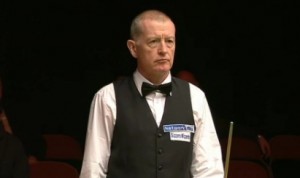
With his original cue returned, Steve then edged out old rival Alan McManus to book his place in the last 16 before knocking out Mark King and the talented young Jack Lisowski to move into a shock semi-final. Though he was to lose out there to Ricky Walden, he had done enough to retain his place inside the top 48 ahead of the first mid-season seedings revision and who knows, perhaps this in itself is his finest achievement to date?
I would love to hear your thoughts and comments on this one which are by no means limited to the eight selections that I have given above.
